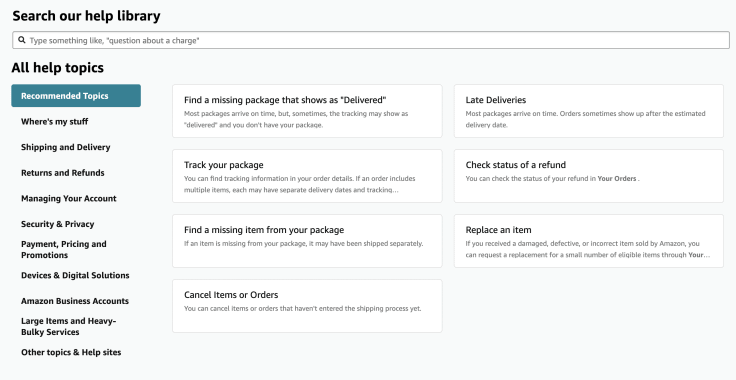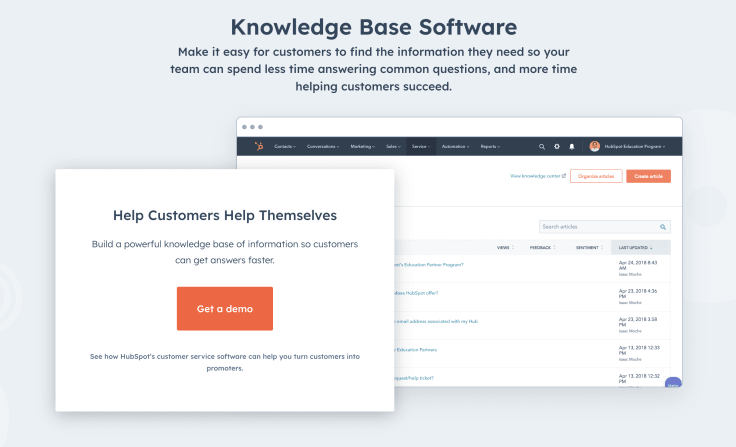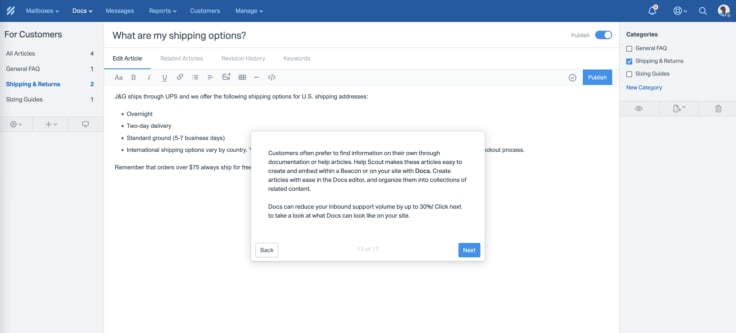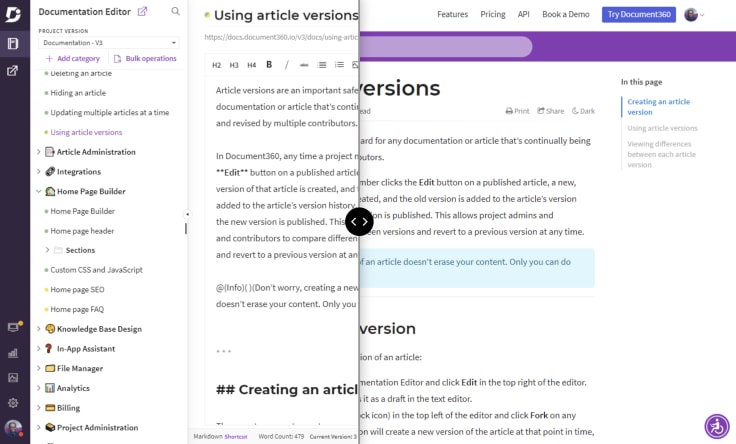
The ecommerce market has been growing rapidly, with global sales reaching $4.13 trillion in 2020. This figure is expected to grow to $6.54 trillion by 2023. There are several reasons for this growth, including the increasing popularity of online shopping, the increasing use of mobile devices for online transactions, and the expansion of ecommerce into new markets such as grocery and healthcare.
As ecommerce continues to grow, it's becoming more and more competitive. And while price is certainly a factor in many purchasing decisions, it's not the only one. In fact, customer experience has become increasingly important in the world of ecommerce.
After all, why deal with the hassle of sloppy customer service issues if you can find an ecommerce business that offers a better experience? They are two clicks away.
Winning customers is about providing them with a frictionless buyer's journey. Of course, it's a complicated, multidimensional process, but we all can improve it one step at a time.
In this article, we shed light on how to improve the consideration and decision stage with a knowledge base for ecommerce.
Why do you need a knowledge base for ecommerce?
If you're running an ecommerce site, there's a good chance you're familiar with the buyer's journey. In a nutshell, it's the process that customers go through when making a purchase, usually from awareness to consideration to decision. And while it's essential for an online business to understand this journey in order to provide the best possible experience for their customers, the reality is that things don't always go smoothly.
Let's focus on the consideration stage. During this stage, customers are seriously evaluating their options and trying to determine which product, service, or brand is the best fit for their needs. This is when customers look up information about a product in order to make an informed decision. And it's good if the information is at their fingertips.
This is where a knowledge base comes in handy. But why a knowledge base and not a live chat with a support agent?
It seems that more and more consumers prefer finding answers on their own. It's partially due to the generational change and the fact that the number of tech savvy consumers has risen. Also, digital literacy is one of the characteristics of Gen Z, born after 1998, which will soon become a significant segment of the market. We all should aim at meeting their expectations.
By allowing easy access to information, you can turn the consideration stage into an opportunity to build trust and relationships with potential customers.
Benefits
If you've ever had a question while shopping online, you know how frustrating it can be to get a hold of a support agent. You have to wait for an answer, and there's a strong chance you won't get it soon. Even when you get in touch with an agent, there's no guarantee they'll be able to answer your questions right away, so your request might even take a few days. An online knowledge base solves this problem, but also benefits other areas of your business.
Faster answers
By housing all the most frequently asked questions and answers in one place, a knowledge base can provide a quick solution to common problems. Best of all, your potential customers don't have to contact your support agents to find the answer they're looking for. In most cases, they'll have their problem solved in minutes.
Every proper knowledge base for an ecommerce store has a search engine with recommendations. Finding information also becomes easy for consumers who, for example, don't know the jargon connected to a product or service. They can just type in a few keywords related to the question and see what pops up.
Another section of a knowledge base is FAQs. It's a great place to start if you're not sure where else to look for basic information. Oftentimes, the answer you're looking for will be right there in black and white.
There's also a possibility to integrate a knowledge base with a live chat app. This way, you can display your knowledge base resources inside a chat window, so a customer can look up their problems before writing a message to one of your agents.
Of course, to be of help to your customers, your knowledge base has to be well organized, easy to navigate, and cover as many issues as possible. But that’s a topic for another time.
Increases productivity
Support agents are under constant pressure to meet customer expectations and resolve issues quickly.
To do this, they need to have instant access to accurate information. A knowledge base is a central repository of information that customer support teams can use to resolve issues more efficiently and faster.
By having all the relevant information in one place, a customer support team can spend less time searching for answers and more time resolving customer issues. As a result, an online knowledge base can improve the productivity of customer support teams and help them deliver better customer service.
Descreases workload
Customer support teams are always looking for ways to lower their workload. By having this information readily available, customer support teams can quickly and easily resolve customer issues. This creates more space for important tasks.
Some live chat tools let you integrate your knowledge base with the chat, so agents get access to knowledge resources directly inside the chat window. With such a solution, they don't have to switch between tabs and waste precious time. If this sounds interesting, here is a bit more information.
Lowers costs
It's no secret that providing excellent customer service can be expensive. At the same time, businesses are always looking for ways to cut costs without sacrificing quality.
A well-maintained knowledge base can reduce costs connected to repetitive queries. With a knowledge base you can still provide great customer support with a smaller team and save on the headcount.
Organizes and maintains company knowledge
Apart from the benefits for customer support, a knowledge base improves the operational efficiency of your organization.
A well-designed knowledge base can be a valuable internal asset for any organization. It can provide employees easy access to the information they need to do their jobs, help establish knowledge maintenance processes, help in employee onboarding, reporting, and other areas.
Most importantly, a knowledge base can help to ensure that your company's collective knowledge is preserved and passed down from one generation of employees to the next.
Improves search visibility
Search engines like Google place a high value on fresh, relevant content. And since a knowledge base is full of articles and FAQs which often change, it's the perfect tool to grow your search presence.
Amazon: a great example of a knowledge base for ecommerce
You already know that Amazon is the biggest ecommerce business out there. With such a large customer base, Amazon wouldn't be able to get to every single customer inquiry without their knowledge base.
Amazon has a comprehensive, but easily navigable knowledge base that is clearly divided into sections. People can quickly find answers with the help of corresponding graphics.
Amazon uses a very noticeable search bar to deter customers from contacting customer support.

Amazon's knowledge base has a section with the most frequently asked questions supplied with helpful video tutorials for actions that might need an extra explanation. Customers can find answers to the majority of problems they might face in Amazon's knowledge base.

The best knowledge base software for the job
There are a lot of different types of knowledge base software out there, and it can be tough to know which one is right for your needs. Here are a few examples to help you get started.
KnowledgeBase
KnowledgeBase is a standalone product that can be integrated with LiveChat. It offers self-service suggestions before your customers start a chat or open a ticket. It allows for easy sharing of resources on chat and in email tickets. It is searchable right in the customer service app, allowing your reps to provide quick answers to customer questions without jumping between tabs.
KnowledgeBase is a simple and quick-to-set-up knowledge base software you can use to build both an external and internal knowledge base. When integrated with LiveChat, self-service can be provided inside a chat window, so there's no need to contact support. On the inside, agents can browse knowledge base resources straight in customer service app.
Other features include:
- External self service portal
- Improved knowledge management
- Custom domain integration
- LiveChat integration: internal help center for agents
- Rich text editor
- Google Analytics integration
- Reports and insights
- Customizable branding
You can try it out for free for 14 days.
Zendesk
Zendesk is a customer service platform that can be used to create internal or external self-service knowledge bases. The editor offers rich formatting, templates, and the ability to save drafts. However, more advanced capabilities are only available in their enterprise plan which might not make it optimal for a small online store.
Other features include:
- External self service portal
- Internal knowledge base
- Google Analytics integration
- Customer feedback
Hubspot
Hubspot Service Hub is ideal for larger online stores. Hubspot Knowledge Base Software allows you to create internal knowledge bases as well as external help centers with customizable looks, which is available as an additional feature in their higher plans. Additionally, robust analytics measuring engagement, sentiment, search, and more, make it easy to review the performance of your help articles.

Other features include:
- Customizable help center
- Language support
- Analytics
- All-in-one platform
- Internal and external
HelpScout
HelpScout's Docs feature is an integral part of its customer service platform that can act as both an internal and external help center. It is highly customizable to match your branding using various options and custom CSS. HelpScout also offers Beacon: a chat-style widget you can embed on any page of your website or app, so users can easily access your knowledge base from wherever they are.

Other features include:
- Customizable external help center
- Optimized for search
- Private collections
- Analytics
- A widget offering help center resources
Document360
If you're looking for a knowledge base software that does more than just the basics, Document360 is a great option. It's user friendly and has powerful search capabilities. You can use it to build internal and external knowledge bases. Some of the interesting features include translation, IP address restriction, and in-depth analytics. However, it might not be the best choice for small businesses because of its price.

Other features include:
- Customizable external help center
- Internal help center
- HTML (WYSIWYG) editor
- Version documentation
- Analytics
- Security with roles, restrictions, and backups
Conclusion
A knowledge base is a great way to improve the customer experience on your ecommerce store. It allows you to provide self-service support so that customers can find answers to their questions without having to contact you directly.
What's more important, they get their answers faster, so their buying experience is seamless and undisturbed. Their consideration stage is smoother and helps them to make a purchasing decision faster.






